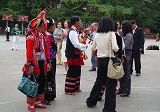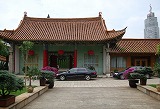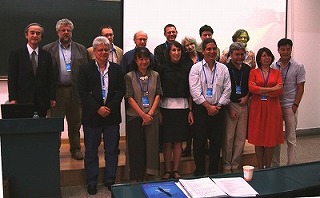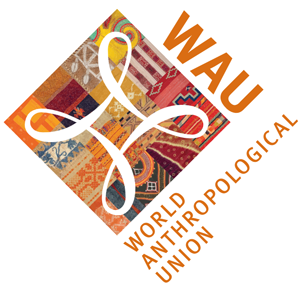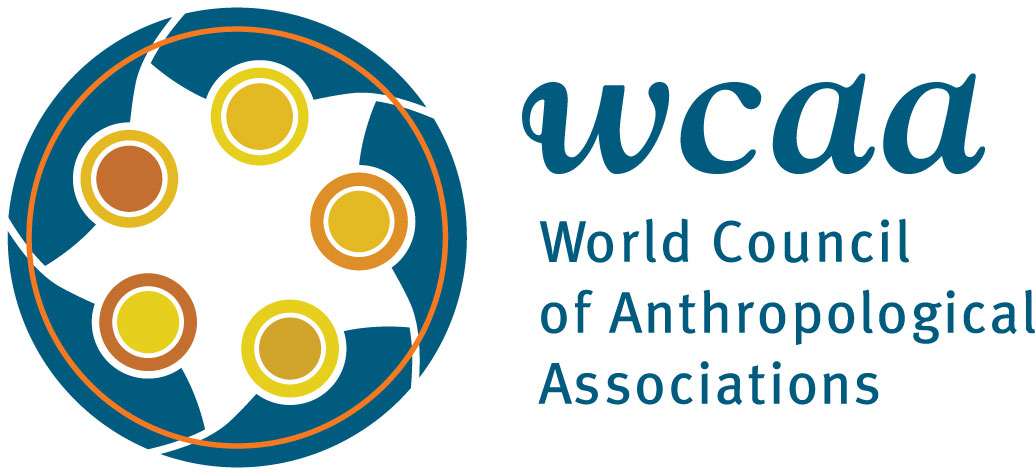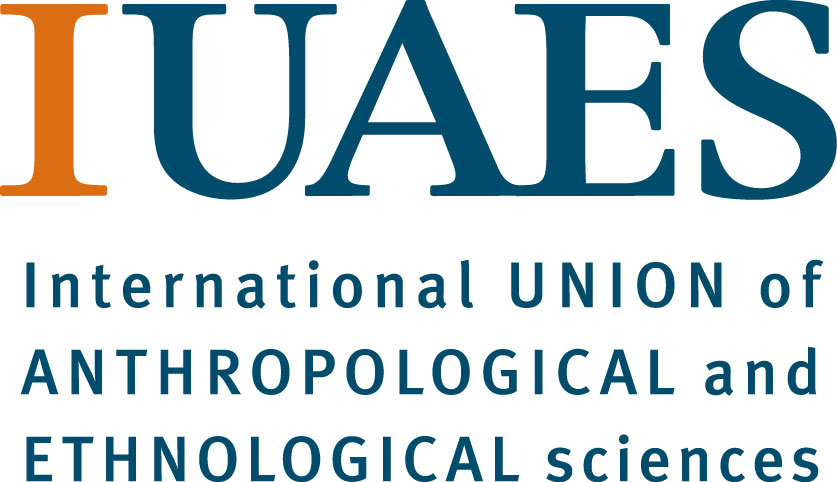
IUAES 2009 China
Report on the 16th Congress of
the International Union of Anthropological and Ethnological Sciences
By Zhang Xiaomin
General Introduction
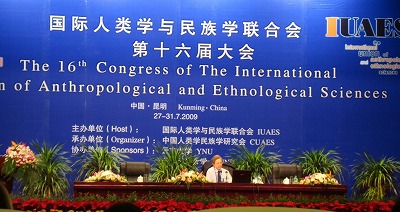 The 16th Congress of the International Union of Anthropological and Ethnological Sciences (IUAES) was successfully organized and held by the China Union of Anthropological and Ethnological Sciences (CUAES) from July 27th to 31st 2009, supported by two institutions in Beijing: Institute of Ethnology and Anthropology, Chinese Academy of Social Sciences and Central Minzu University of China, and hosted by two universities in Kunming: Yunnan University an Minzu University of Yunnan. Five keynote speeches and 14 distinguished lectures were delivered by world renowned scholars at the congress. About 5,000 scholars and students from 116 countries and regions attended the Congress.
The 16th Congress of the International Union of Anthropological and Ethnological Sciences (IUAES) was successfully organized and held by the China Union of Anthropological and Ethnological Sciences (CUAES) from July 27th to 31st 2009, supported by two institutions in Beijing: Institute of Ethnology and Anthropology, Chinese Academy of Social Sciences and Central Minzu University of China, and hosted by two universities in Kunming: Yunnan University an Minzu University of Yunnan. Five keynote speeches and 14 distinguished lectures were delivered by world renowned scholars at the congress. About 5,000 scholars and students from 116 countries and regions attended the Congress.
The exciting programs included 239 academic sessions/panels with more than 5000 paper abstracts, 6 cultural exhibitions, 5 Study Tours and 23 films, exploring the theme of "Humanity, Development, Cultural diversity". It was the most attended congress in the history of IUAES.
Besides participants’ papers abstracts, CD-ROMs were included in the materials to the participants. The CD-ROM included the research results from the three projects conducted by a number of experts and scholars on ethnic studies in China for the event: "China's Ethnic Affairs Administration, "Culture of Chinese Ethnic Minorities" and "Historical Foundation and Current Development of Anthropology and Ethnology in China".
Scholars all over the world shared their latest academic research, and expressed that the Congress was truly an international academic conference with distinctive characteristics, rich content and substantial impact on the discipline. During the congress, colorful Chinese culture is admired by foreign scholars.
The congress has successfully attracted extensive attention from the national mainstream media; the organizing committee held daily press conference during the Congress, updating the progress of the conference. Mainstream media in China reported the full program of the Congress timely. More than 60,000 printed and website posted articles reported the opening and the closing ceremonies, keynote speeches, distinguished lectures, academic sessions/panels, film exhibition, and cultural exhibition in details. Many domestic print media and websites did follow-up reports of the Congress as well.
The success of the Congress gives credits to the Kunming Declaration drafted by the congress’s organizing committee and adopted by IUAES members on July 30th, 2009. It is also grateful to the active participation of the Chinese scholars who organized the sessions and presented their research findings. The Congress was indeed a significant event for the host country of China. It was the first time China made her voice well heard by the international anthropological and ethnological circles.
Now the report will introduce the Congress results in the following sections:
The Keynote Speeches, Distinguished Lectures
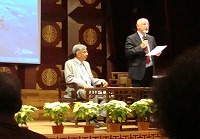
Nearly 5,000 experts, scholars and students from over 116 countries and regions of the world attended the Congress. They included a good number of renowned scholars in their own fields, international leading scholars. Five top scholars made keynote speeches in the plenary session in the opening ceremony and 14 outstanding scholars delivered Distinguished Lectures to the participants. Their presentations represented the most cutting-edge research in Anthropology. Their speeches are now collected and published in Keynotes in Anthropology, which is one ofthe 32 published volumes of the Congress publication series.
A few representative contributors to the volume are: Napoleon Wolanski (developments in physical anthropology in general), Xinzhi Wu (physical anthropology in relation to China ) and Keiichi Omoto (physical anthropology in relation to Japan ), Hao Shi-yuan (anthropology and ethnology refers to China) Soheila Shahshahani (globalization), Peter J.M. Nas, Marlies de Groot and Rosalie de Bruijn (urban symbolism), Italo Pardo (citizenship), and Dawn Chatty (environment), Subhadra Mitra Channa, Faye Harrison and Bernard Wong (social diversity in relation to race, class, gender, ethnicity and professions). All these papers represent the state of the art in the anthropology of the first decade of the 21st century.
Academic Sessions/Panels
Since the call for papers made in August 2006, the Academic office’s organizing committee received 456 applications for session/panel and round table discussion from scholars all over the world. The Directors of the Academic Working Committee held meetings regularly, screened and approved altogether 340 sessions/panels and 7 round table discussions. These sessions/panels were finally combined into 239 sessions/panels according to different themes. The 239 panels explored issues on cultural diversity, AIDS, child trafficking, global aging, ethnicity, urban development, religions and linguistic evolution, etc. It covers 36 sub-disciplines or sub-research field as the following:
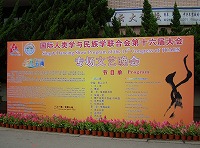 |
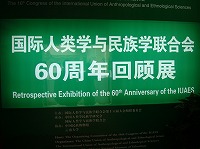 |
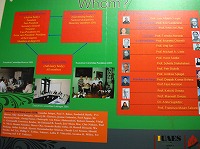 |
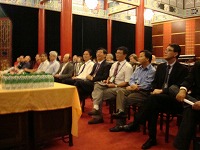 |
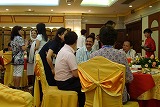 |
- Aging and the Aged
- Anthropology of AIDS
- Archaeological Anthropology
- Children, Youth and Childhood
- Communication Anthropology
- Cultural Diversity in Multi-disciplinary Research
- Development and Economic Anthropology
- Educational Anthropology
- Enterprise Anthropology
- Ecological/Environmental Anthropology
- Ethnic Culture Studies
- Ethnic Relations and Ethnic Identities
- Food and Nutrition
- Gender and Woman Studies
- Globalization Anthropology
- Historical Anthropology
- Human Ecology
- Human Rights
- Indigenous Knowledge
- Legal Anthropology and Legal Pluralism
- Linguistic Anthropology
- Mathematics Anthropology
- Medical Anthropology, Epidemiology
- Migration Anthropology
- Museum and Cultural Heritage
- Nomadic Peoples Studies
- Physical Anthropology and Molecular Anthropology
- Psycho-anthropology
- Religious Studies
- Sport Anthropology
- Theoretical Anthropology
- Tourism Anthropology
- Urban Anthropology
- Urgent Anthropological Research
- Visual Anthropology
- Yunnan Studies
Humanity, Development and Cultural Diversity:Reports on the academic sessions in the 16th World Congress of the IUAES, the collection of the reports on the academic sessions written by the session organizers, summarized the highlights of the sessions.
Academic exchange and showcase of the discipline of Anthropology and Ethnology in this Congress indicate the following distinct developments. First, it paid more attention to the applied value of anthropology, emphasizing the application of anthropological knowledge to answering everyday life challenges, such as AIDS, immigration, drug addiction, medical science, urban and other applied research of the practical issues. Another example is the sessions on ethnic economic development issues and ethnic cultural preservation issues that bear tremendous policy implications for policy-makers. Second, cross-disciplinary research is a very significant feature in this Congress. An excellent cross-disciplinary study between anthropology and different disciplines can be observed in cooperation studies. Other examples can be found in cross-disciplinary studies in anthropology with political science, linguistics, history, environmental science, education, business management, and so on. Third, some specialized topics and issues within anthropology are emerging. These topics are so prominent that they become specialized fields in anthropology research and other topics become sub-disciplines of anthropology. These emerging topics are: gender studies, studies on aging and the aged, studies on children and youth, research on indigenous knowledge, migration research, etc. Fourth, scholars all over the world show tremendous interest in studying China and Asia. Fifth, a number of sessions/panels co-organized by both Chinese and foreign scholars show strong collaboration between international and Chinese anthropologist & ethnologists.
This Kunming Congress marks a distinct difference from previous Congress conferences. The 16th Congress shows the milestone of Chinese anthropology & ethnology. The achievements are: (1) some research fields have been developed to fully or partially reach the international advanced level, which indicates that the standard of Chinese anthropology & ethnology has been significantly raised; (2) there is an increase in interdisciplinary study. The promising sub-disciplines are ecological/environmental anthropology, business anthropology, development/economic anthropology, urban anthropology, educational anthropology, tourism, anthropology, etc.; (3) some traditional disciplines or research fields have been further developed. All these achievements indicate that the development of anthropology & ethnology in China has been upgraded to a historical height.
Cultural Exhibition
During the 16th Congress of the International Union of Anthropological and Ethnological Sciences, 6 exhibitions were held in Yunnan University. It attracted much attention.
The 6 exhibitions were: "Colorful China: China 's Minorities ", "Native Cultures in the World", "Book Fair on International Anthropological and Ethnological Sciences ", "Poster Sessions: Exhibition of Institutions' and Individuals' research", "Retrospective Exhibition of the 60th Anniversary of the IUAES" and "Retrospective Exhibition on the 100-year Development of Anthropological and Ethnological Sciences in China ". The exhibitions were hosted by the organizing committee of the International Union of Anthropological and Ethnological Science and collaborated by China National Museum and Yunnan University. The grant opening ceremony of the exhibition celebrated the 60th anniversary of the IUAES in Kunming. These lively exhibitions showed the mien of ethnic minorities in China and showcased the latest Chinese anthropology and ethnology research results with rich material, photographs and detailed data.
Film Festival
6 anthropology films were awarded for their excellence at the 16th IUAES Congress. The other 17 films received the nomination award at the closing ceremony in the afternoon of July 31st, 2009.
The film section organizers of the Congress collected films from all over the world. A total of 362 films were collected before February, 2009. The quantity of films collected created a record of the film festival in the Congress.
The Executive Committee of the Film section developed rigorous screening procedure and standard for the anthropological films and videos. Both domestic experts and overseas experts in related fields made two rounds of selection. 23 films were nominated. These films were showed at Yunnan University Sciences Museum during the Congress.
The 6 excellent films awarded in this Film Festival are "The Dilemma of Duka", "Los Muertos on Rule and Law of Koriam", "The Revenge of Hanxin ", "Rules Left By Ancestors", "Family "and "People Lived In Golden Triangle".
Study Tours
Five study tours to the ethnic minority communities near Kunming attracted many participants of the Congress:
- Da Nuohei Village, a village of Yi people and Yi culture;
- Keba Village, a village of epic and folk dance of A’xi, a branch of the Yi people;
- Nagu Town, a town mainly with Hui population, which is famous for “town of overseas Chinese” and “town of handicraft”. The Najia Ying mosque built in 2004 is the largest mosque in Yunnan Province;
- Daying Street, a community mostly with Han population, known as “the First Village of Yunnan” for its developed collective economy since 1978.
- Minzu Museum of Yunnan, a well-known museum in Asia and the largest museum on ethnic minorities in China.
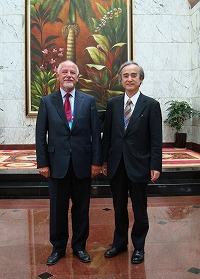
New Leadership of IUAES
During the Congress, IUAES conducted a general election. Prof. Peter J M Nas was elected as the new President of IUAES and Prof. Junji Koizumi was elected as the Secretary-General of IUAES. A new executive committee of IUAES was also elected.
Two New Commissions Approved and Established
Two new commissions were approved by IUAES and announced to be set up in the Congress: Commission on Anthropology of the Middle East (Chairperson: Soheila Shahshahni) and Commission on Enterprise Anthropology (Chairperson: Prof. & Dr. Zhang Jijiao ). There are 29 IUAES scientific commissions now with the setup of the two new commissions.
Publications:
The Official Launch of Book Series on the 16th World Congress of IUAES
During the Congress, Anthropology Now ( English version and Chinese version), edited by Peter Nas and Zhang Jijiao, were published specially for the event. It is a collection of papers on history of the IUAES, its development process and achievements, and you can also find papers written by chairs of the IUAES scientific commissions on the latest research findings and trends.
After the Congress, China Union of Anthropological and Ethnological Sciences (CUAES) has published collections of papers. Entitled Anthropology and Ethnology Today Series is a-32-volume paper series selected from the 16th World Congress of International Union of Anthropological and Ethnological Sciences (IUAES). The editing and publishing of the book series are organized by CUAES. The official ceremony of the book launch with a round-table discussion was held in Beijing on February 23, 2012.
Directory and purchasing contactor of the Book Series (altogether 32 volumes)
Publisher: The Intellectual Publishing House, Beijing, China
For purchasing the books, please contact the following:
China International Book Trading Corp.
ts2[at]mail.cibtc.com.cn; ts4[at]mail.cibtc.com.cn
20 English books are as follows:
- Keynotes in Anthropology
Edited byPeter Nas, Hao Shi-yuan and Zhang Xiao-min
ISBN: 978-7-5130-0828-0/C·122(10360) Price (RMB): ¥36 - Issues of Language Endangerment
Edited by Xu SHI-XUAN,CECILIA BRASSET,TJEERD DE GRAAF
ISBN: 978-7-5130-0866-2/H·067(10367) Price (RMB): ¥45 - Human Ecology
Edited by Anna Siniarska and Napoleon Wolański
ISBN: 978-7-5130-0447-3/Q·008(10333) Price (RMB): ¥35 - Labor Migration and Social Mobility in Asia and Pacific Region
Edited by Ellen R. Judd and Zhang Jijiao;
ISBN: 978-7-5130-0829-7/F·457(10358) Price (RMB): ¥45 - Ethnic Relations
Edited by E.L. Cerroni-Long and Zhou Jian-xin
ISBN: 978-7-5130-0574-6/D·1220(10341) Price (RMB): ¥38 - Setting an Agenda for World Anthropologies
Edited by Gustavo Lins Ribeiro
ISBN:978-7-5130-0870-9/Q·012(10365) Price (RMB): ¥30 - Applied Anthropology, Development and Cultural Diversity
Edited by P.R.G.Mathur
ISBN: 978-7-5130-0823-5/Q·010(10357) Price (RMB): ¥42 - Indigenous Knowledge and Sustainable Development
Edited by Dorothy Billings, Viatcheslav Rudnev
ISBN: 978-7-5130-0824-2/D·1326(10362) Price (RMB): ¥30 - China’s Environmental Issues: The Perspective of Multi-disciplines
Edited by Li Yujun, NAKAWO Masayoshi
ISBN: 978-7-5130-0868-6/X·014(10366) Price (RMB): ¥30 - Perspectives on Visual Culture from China: Methodology, Analysis and Filmic Representations
Edited by Zhuang Kong-shao
ISBN: 978-7-5130-0872-3/J·029(10363) Price (RMB): ¥38 - Enterprise Anthropology: Applied Research and Case Study
Edited by Zhang Ji-jiao and VOON Phin Keong
ISBN: 978-7-5130-0905-8/F·476(10370) Price (RMB): ¥35 - Humanity Development and Cultural Diversity
Edited by P.R.G.Mathur
ISBN: 978-7-5130-0865-5/C·123(10369) Price (RMB): ¥35 - Physical Anthropology
Edited by Huan-jiu Xi Co-Editor:Lian-bin Zheng, You-feng Wen, Fei Xu, Xiao-ping Gao
ISBN: 978-7-5130-0871-6/Q·011(10364) Price (RMB): ¥30 - Human Rights
Edited by Buddhadeb Chaudhuri
ISBN: 978-7-5130-0832-7/D·1321(10361) Price (RMB): ¥48 - Educational Anthropology
Edited by Chen Bateer, Chen Xiao-ying, Paul Maxim
ISBN: 978-7-5130-0867-9/G·440(10368) P rice (RMB): ¥30 - Modern Pastoralism and Conservation: Old Problems, New Challenges
Edited by Dawn Chatty, Troy Sternberg
ISBN: 978-7-5130-0881-5/C·126(10359) Price (RMB): ¥45 - Studies in Yunnan
Edited by He Shao-ying, He Ming
ISBN: 978-7-5130-0965-2/D·1370(10370) Price (RMB): ¥55 - Language Change and Ecology
Editor: Zhou Qing-sheng, Associate Editor: Dong Jie
ISBN: 978-7-5130-0833-4/H·066(10355) Price (RMB): ¥26 - Humanity, Development and Cultural Diversity: Reports on the Academic Sessions in the 16th World Congress of the IUAES
Edited by Huang Zhong-cai
ISBN: 978-7-5130-0575-3/C·114(10342) Price (RMB): ¥40 - Anthropology Now ----Essays by the Scientific Commissions of the International Union of Anthropological and Ethnological Sciences (IUAES) and History of the International Union of Anthropological and Ethnological Sciences (IUAES)
Edited by Peter Nas and Zhang Jijiao
ISBN: 978-7-80247-755-1 Price (US dollar): $48
12 Chinese books are as follows:
- Humanity, Development and Cultural Diversity:Reports on the academic sessions in the 16th World Congress of the IUAES”Edited by Zhou Mingfu Huang Zhongcai;(《人类,发展与文化多样性——国际人类学与民族学联合会第十六届大会的专题会议综述》)
Edited by Huang Zhong-cai;
ISBN: 978-7-5130-0448-0/C·110(3357) Price (RMB): ¥50 - The Classics and Vigour of Dermatoglyphics (《肤纹学之经典和活力》)
Edited by Zhang Haiguo
ISBN: 978-7-5130-0827-3/D·1317(10353) Price (RMB): ¥40 - Interpretation of Hakka History and Culture in Anthropological View (《解读客家历史与文化:文化人类学的视野》)
Edited by Fang Xue-jia; Co-editor: Xia Yuan-ming Song De-jian
ISBN: 978-7-5130-0606-4/K·092(3505) Price (RMB): ¥58 - Urban Ethnic Groups and Their Relationship (《都市族群与族群关系》)
Edited by Xu Xian-long
ISBN: 978-7-5130-0601-9/C·116(3503) Price (RMB): ¥45 - Diversity and Change: Cross-Cultural Perspectives on Marriage and the Family (《多样性与变迁:婚姻家庭的跨文化研究》)
Edited by Qu Ming-an, Shi Chuan-gang
ISBN: 978-7-5130-0803-7/C·120(10352) Price (RMB): ¥48 - Minzu Harmony in the Context Cultural diversity (《文化多样性背景下的民族和谐》)
Edited by He Xing-liang, Guo Hong-zhen
ISBN: 978-7-5130-0826-6/G·435(10350) Price (RMB): ¥75 - Religious Harmony in the Context of Cultural Diversity (《文化多样性背景下的宗教和谐》)
Edited by He Xing-liang Guo Hong-zhen
ISBN: 978-7-5130-0825-9/B·043(10354) Price (RMB): ¥46 - Folk Culture and religion (《民俗文化与宗教信仰》)
Edited by Se Yin
ISBN: 978-7-5130-0877-8/K·107(3763) Price (RMB): ¥45 - Ethnic Minority Woman Health and Eco-Environment in the Gender Perspective (《社会性别视角下少数民族妇女的健康与生态环境》)
Edited by Yang Guo-cai
ISBN: 978-7-5130-0612-5/R·039(3544) Price (RMB): ¥55 - Cultural Diversity and Legal Pluralism: legal anthropology Perspectives (《文化多元与法律多元:法人类学的视角》)
Edited by Zhang Guan-zi
ISBN: 978-7-5130-0822-8/D·1318(10356) Price (RMB): ¥65 - A Global Event, Fruitful Results - New Academic Achievements in the 16th IUAES World Congress (《世界的盛会 丰硕的成果——国际人类学与民族学联合会第十六届大会最新学术成果概述》)
Edited by Huang Zhong-cai, Zhang Jijiao
ISBN: 978-7-5130-0834-1/C·128(3866) Price (RMB): ¥60 - Anthropology Now(《当今国际人类学——国际人类学与民族学联合会各专业委员会的论文和国际人类学与民族学联合会的历史》)
Edited by Peter Nas and Zhang Jijiao
ISBN: 978-7-80247-756-8/Q·002(2590) Price (RMB): ¥48
